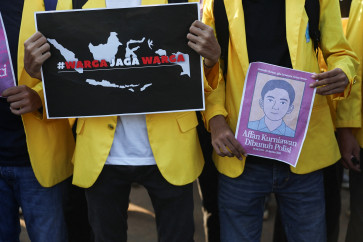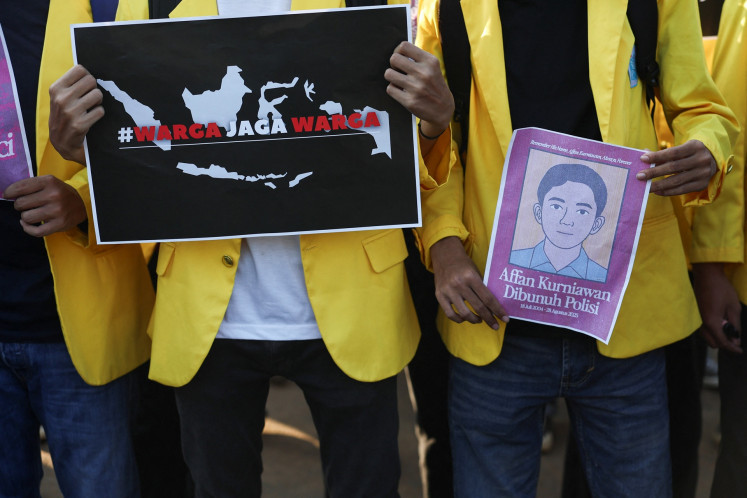Popular Reads
Top Results
Can't find what you're looking for?
View all search resultsPopular Reads
Top Results
Can't find what you're looking for?
View all search resultsGusti Asnan: Advocating for marginalized history
Gusti Asnan
Change text size
Gift Premium Articles
to Anyone
Gusti Asnan. Courtesy Gusti Asnan
One of the major challenges now facing historians in this country is how to dismantle official history and historiography, making any research about oppression vital.
'Reform opened up limitless opportunities for tremendous things that were considered objectionable by ruling authorities under Soeharto's New Order regime,' said Gusti Asnan, a lecturer in history at Andalas University School of Humanities in Padang, West Sumatra.
'In a situation where an official historiography conforms to the interests of government, writing the history of oppressed people and their stories has its own forms of risk. This is particularly true as it reveals the government's past.'
Gusti, born in Lubuk Sikaping, West Sumatra, 51 years ago, completed his dissertation in history in 1998, titled Trading and Shipping Activities: The West Coast of Sumatra, 1819'1906, at the University of Bremen in Germany.
He was following a natural sciences track in high school but, but after taking the entrance test for public university, he had a change of heart, preferring to study history instead.
An interest in history was a blessing in disguise.
Gusti was not just absorbed in most of the books that he came across during his undergraduate study, but he was committed to conducting research on historically important people and events that had yet to be fully revealed and examined.
From 2001-2002, while in the Netherlands, he had the chance to carry out groundbreaking research on West Sumatra in the 1950s, thanks to support from the Indonesian Academy of Sciences (AIM) and the Royal Netherlands Academy of Arts and Sciences (KNAW).
The opportunity provided him with unlimited access to sources that many Indonesians were not familiar with.
Three books, seven journal articles and dozens of freelance articles have been released following this research.
One of the books (Rethinking Regionalism: West Sumatra in the 1950s published by Yayasan Obor Indonesia in 2007 ' became his magnum opus.
The book received warm reviews, not only from local media such as Kompas daily but also from the Journal of the Humanities and Social Sciences of Southeast Asia in the Netherlands.
His book was described by Kompas as representing critical findings on how Indonesians' hunger for regionalism and autonomy during the Reform Era was nothing more than repetition or 'copy and paste' of what had happened in 1950s across the region, particularly in West Sumatra.
Furthermore, the country's largest newspaper lauded the author for applying a local instead of a central, Jakarta-based approach, which was the general trend in Indonesian historiography until the mid-1980s.
Gusti admitted that the study of history is different in Indonesia than abroad. Historical research can be carried out as long as there are sources.
'The more contemporary [the] period is, the more difficult [it is] to get the sources. [The] Dutch could provide ample sources of Indonesia. We truly rely on Dutch archives,' he pointed out.
Gusti frankly says that Western historical approaches and theories have yet to develop in this country.
The best historians, he said, were modifying and building upon historical approaches and theories they got from abroad, rather than from purely domestic exploration.
One example of a local historian who followed such an approach, Gusti said, was Sartono Kartodirdjo, a pioneer in writing multidimensional histories.
In his work, Sartono emphasizes that making history should involve anthropology, sociology and other social sciences, he said.
Gusti's interest in reformed historiography lead him to be involved in many activities pertaining to the Emergency Government of the Republic of Indonesia (PDRI).
'In popular history, it is often said that 'history is written by the victors'. In Indonesia, the victor is the government. It plays a significant role, in both Old Order and New Order administration, in determining what can and cannot be written,' Gusti said. 'The loss of PDRI in Indonesian historiography is just one example of how history is written by the winners.'
In relation to distinctive features of writing history prior to and after the Reform Era, Gusti pointed out that historiography is a matter of zeitgeist. While freedom was restricted under the Soeharto regime, historiography was also exclusive and limited, he added.
'Now the reform period is paving the way for more open and dialogical historiography; no more censorship or taboo.'
Open democracy during Reform was not without consequence, figuring in revised historiography.
Gusti received much criticism and many threats after publishing his magnum opus, Memikir Ulang Regionalisme Sumatera Barat, which was his attempt to show that the Revolutionary Government of the Republic of Indonesia (PRRI) was a disobedient movement against the central government.
While many West Sumatrans do not believe that PRRI represented rebellion, Gusti insisted that it was insurgence, cushioned by abundant historical evidence taken from Dutch archives.
His passion for history and his contributions to reformed historiography, as well as his research, earned him the university's award for best research lecturer in 2009 and a new position as the school's dean last September.
'Historians can research anything,' he says. 'But don't forget about moral responsibility.'










